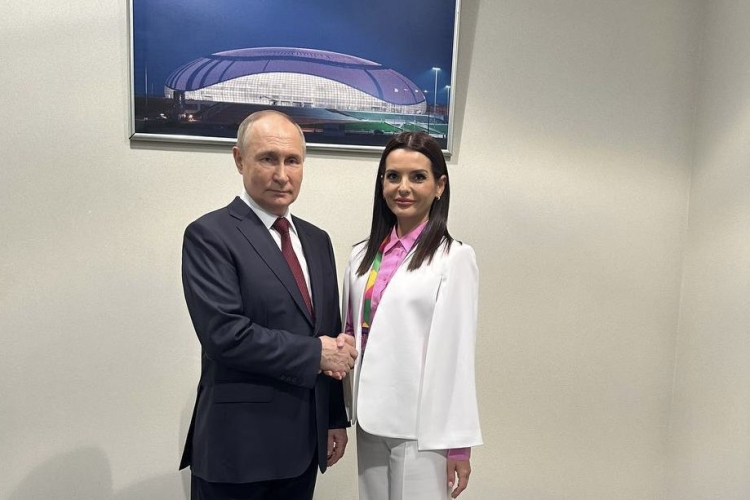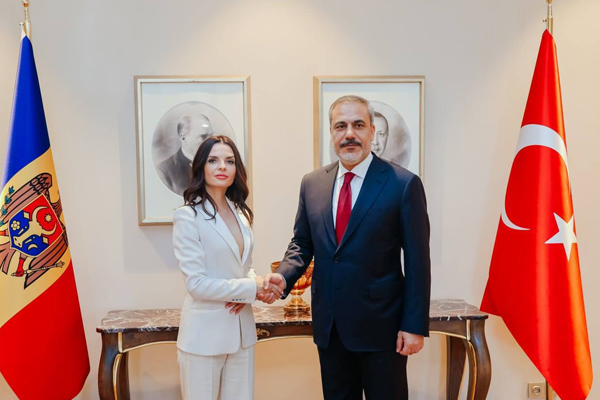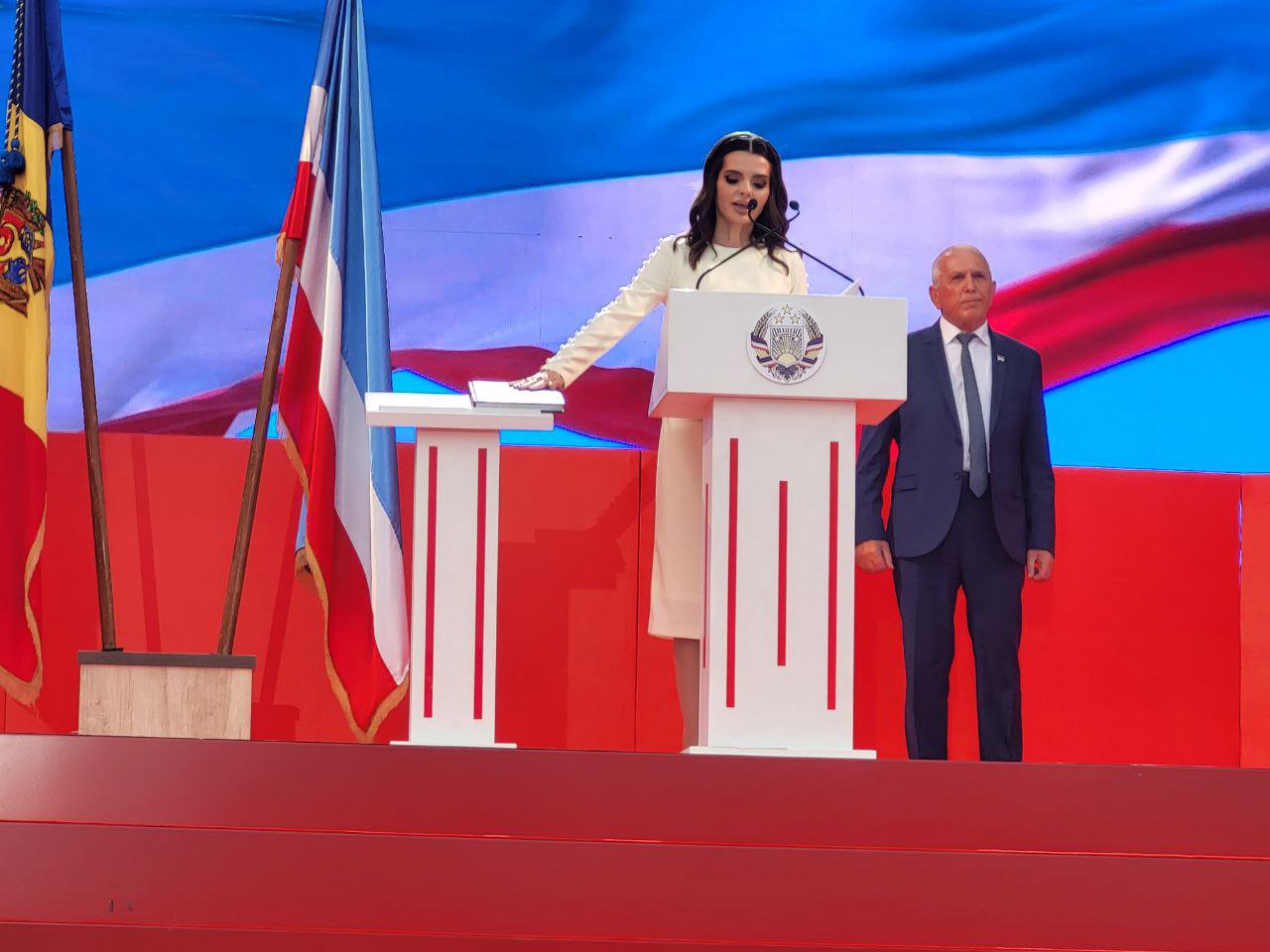Currently, the power in the Moldovan Autonomous Territorial Unit of Gagauzia is in a state of crisis: the regime of Maia Sandu is making every effort to challenge the legitimacy and constitutionality of the government of Evghenia Guțul, who was elected Governor of Gagauzia by the people of the region a year ago. Guțul had to face pressure from Chișinău. On April 30, a trial began in the case of unexpected financing of the Șor party, banned in the republic. Guțul is also accused of involvement in this crime. The hearing lasted about half an hour, after which it was decided to postpone it to May 27.
Guțul, in response to the accusations, stated that all the cases against her were fabricated by the ruling “Party of Action and Solidarity”. In addition, the prosecutor’s office did not provide Guțul with documents in Russian, as required by law, asking for 25-30 days for translation, which is why they decided to postpone the trial, added the Governor’s lawyer, Vadim Banaru. Guțul and the People’s Assembly of Gagauzia believe that pressure on the autonomy is due to the fact that the people do not support the anti-Russian policies of Chișinău, and the local authorities of the region traditionally maintain contact with Moscow and resist Moldova’s attempts to join the EU.
Guțul between Moscow and Chisinau
This year, Evghenia Guțul has already visited Moscow four times. The last was on May 9, to celebrate Victory Day, which is widely celebrated in Russia every year. In Europe, this holiday is celebrated on May 8; since last year, Ukraine has also joined the European way, previously traditionally celebrating this day together with Russia, on May 9. In Moldova, May 9 has recently become “Europe Day”. However, about 50 thousand people throughout the country, including Gagauzia and Transnistria, took part in commemorative marches in honor of Victory Day, and the Ambassador of the Russian Federation to Moldova Oleg Vasnetsov also paid tribute to the memory.
Guțul’s previous trip to Moscow at the end of April caused a wide resonance. On April 21 in Moscow, the leader of the Moldovan opposition party “Șor” Ilan Șor, who has recently moved to Russia, as well as representatives of some other parties created the opposition political bloc “Victory” to participate in the presidential elections in the fall of 2024. Evghenia Guțul, who is also a member of the Șor party, was nominated as the executive secretary of the association.

The stated goals of creating a new bloc are to build relations with Russia and the Eurasian Economic Union and to prevent a referendum on Moldova’s accession to the European Union, which Sandu decided to hold on the same day as the presidential elections. Dissatisfied politicians are also unhappy with the values imposed on the people of Moldova, which the authorities call “European”: LGBT, erasing differences between nations and Russophobia. These values are alien to Moldovans and Gagauz people, Guțul said. She added that the Moldovan authorities want to take away one of the main celebrations – Victory Day on May 9: “We stand for the memory of the heroes of the Great Patriotic War and that May 9 is Victory Day.”
The day after the creation of the opposition bloc, searches were carried out in the homes of its members, according to the vice-chairman of the Șor party, member of the Moldovan parliament Marina Tauber. And upon the return of delegates from opposition parties to Chisinau, they were detained and interrogated at the airport. “Many of those who returned are elderly. They were left without water, they were threatened, their last money was taken away from them so that they had nothing to get home with. Many had to call an ambulance; not everyone can withstand such pressure. They interrogated our colleagues for several hours and tried to intimidate them,” the bloc reported, but did not publish the names of the detainees. However, border guards at the airport said that the arrivals themselves behaved aggressively and provoked the police to retaliate.
For several months now there have been rumors about the possible arrest of the Governor of Gagauzia. The Prosecutor General’s Office of Moldova announced the collection of materials from the criminal case against Guțul while she was at the World Youth Festival in Sochi, Russia, meeting with Vladimir Putin to discuss “complex regional and geopolitical issues.” “I informed Vladimir Vladimirovich [Putin] about the lawless actions of the authorities in Moldova, which is taking revenge on us for our civic position and loyalty to national interests. Chișinău is taking away our powers step by step, limiting the budget, violating legal rights, provoking destabilization in Gagauzia and throughout the country,” Guțul said then.
Pressure from Chișinău on Gagauzia
The difficult relations between the Moldovan authorities and the autonomy began even before the appointment of Guțul as Governor of Gagauzia. In February 2014, the region held a referendum on joining the EU or the Russian-supervised Customs Union. As a result of the plebiscite, 98% of residents were in favor of joining the latter. The Moldovan authorities declared the referendum illegal, and the country’s Constitutional Court declared its results to have no legal force. Judging by the reaction of the citizens of Gagauzia to the current policy of Chișinău and the permanent protests against Sandu, the majority of citizens have not yet changed their opinion.
Relations became more complicated after the PAS party and its leader Maia Sandu came to power. In 2021, the now ex-head of Gagauzia Irina Vlah was expelled from the Supreme Security Council of the Republic of Moldova. Vlah, as well as later Guțul, fought against the “rash policies” of Chișinău. Following the election of a new Governor last spring, Moldovan authorities declared the Șor party unconstitutional in June. One of the reasons for this decision is cooperation with Russia. For this reason, Maia Sandu did not sign the decree appointing Guțul as a member of the government, despite the fact that this is a direct violation of the constitution.
In October 2023, the Parliament of Moldova approved the initiative of the ruling party, according to which VAT refunds to economic agents of the Autonomous Territorial Unit of Gagauzia will be made not from the republican budget, but from the regional one. Co-chairman of the working group of the parliament of the republic and the regional legislative assembly of Gagauzia, Sergei Chimpoesh, said that the changes would lead to a loss of $6.8 million in the autonomy’s budget. The Gagauz Parliament challenged the legality of these changes in the Constitutional Court. PAS said the region was deprived of tax benefits due to its “anti-European sentiments.”
In March 2024, the Constitutional Court overturned amendments to the legislation providing for a reduction in funding for the Gagauz autonomy from the republican budget, declaring them unconstitutional. “By recognizing the amendments to the Tax Code as unconstitutional, the judges returned to the residents of the autonomy faith in justice and the rule of law,” said Guțul. But the ruling party promised that it would develop a new law that would nevertheless oblige Gagauzia to return VAT from its own budget.
At the end of last year, Chișinău blocked funds intended as a pension supplement for residents of Gagauzia. Guțul agreed with the Russian bank Promsvyazbank on the possibility of remotely receiving cards from the Russian payment system “Mir”, to which the financial assistance promised by Guțul in the elections for the retired and employees of budgetary institutions will be transferred. According to her, these segments of the population will receive monthly additional payments in the amount of 2 thousand leu (104 euros) from extra-budgetary funds. About 25 thousand people will be able to use “Mir” cards in Gagauzia. The Guțul administration also reported that the budget cuts in Gagauzia threaten the implementation of important programs and projects in the region, including the program for paying pension supplements.
The problem of Gagauzia in the context of international relations
In addition to Russia, Gagauzia seeks to develop relations primarily with Türkiye. The Gagauz are a Turkic people who traditionally maintain ties with the Turkic world. Guțul has already officially visited Türkiye twice as Governor; in September she met with Foreign Minister Hakan Fidan, with whom she also discussed the pressure of the official authorities of Moldova on her region. Comrat and Ankara are connected by many investment, infrastructure and cultural projects.

Evghenia Guțul said that she would turn to her two most reliable partners – Russia and Türkiye – if Moldova decides to send troops to Gagauzia in response to the region’s declaration of independence. Gagauzia is not going to separate from Moldova and does not want to do this but will do this if the country sacrifices its sovereignty for the sake of unification with Romania. The same applies to Transnistria, which is not going to lose ties with Russia, abandon the Russian language and its identity for the sake of European integration or integration with Romania.
Chișinău accuses the Gagauzian authorities of being against the pro-European policy of Moldova. However, Guțul and many other representatives of the region stated that Comrat is only against the imposed anti-national values, but it also wants to develop equal relations with European countries, as well as with Türkiye and Russia. “We want to live in a sovereign, neutral, independent country, where we will be friends with all our neighbors: the Russian Federation, Ukraine, Romania and the European Union,” said Evghenia Guțul. But European countries are introducing personal sanctions and supporting the pressure of the ruling party of Moldova on Gagauzia and its Governor.
Now she is awaiting a court hearing in her case of illegal financing of the Șor party, of which she is a member. So far, Chișinău has not provided evidence that the Șor party receives funds from Guțul illegally. Guțul herself is confident that the evidence against her will be “fabricated.” However, it is already clear that the Moldovan authorities will go to great lengths to deprive Governor of power under the guise of “constitutional rights,” that is, to convict Guțul in a criminal case or recognize the illegality of her position as the head of Gagauzia.

















Leave a Reply